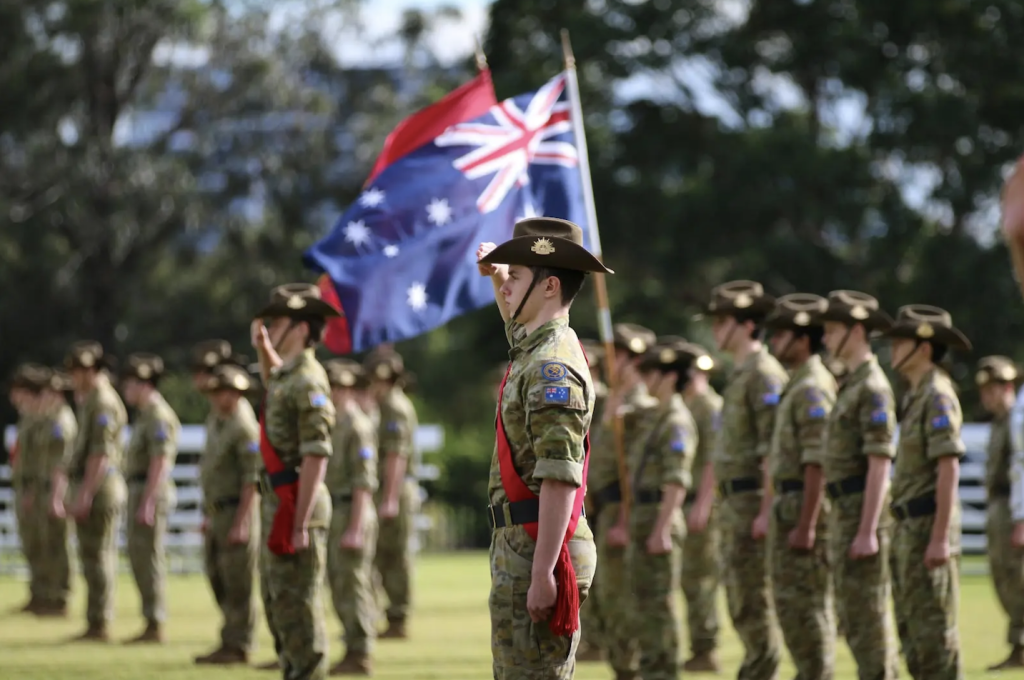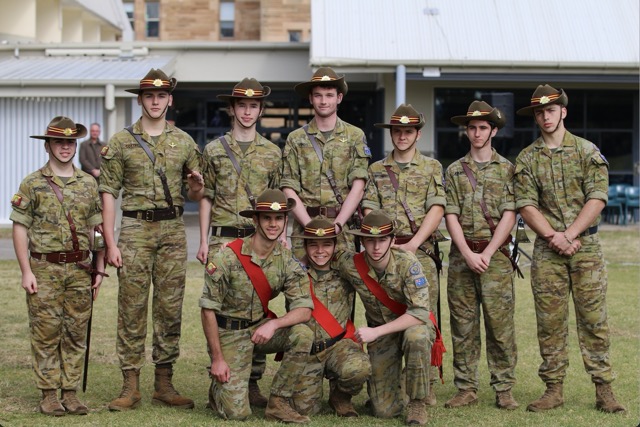Holy Cross Army Cadet Unit
 The Holy Cross Cadet unit was first established in 1909.
The Holy Cross Cadet unit was first established in 1909.
The Australian Army Cadets (AAC) is a national youth development program that shares the values of the Australian Army and emphasises fieldcraft and leadership training. Cadets have opportunities to develop their teamwork, leadership, communication and problem-solving skills in a safe environment that fosters engagement and discipline
Cadets are not members of the Australian Defence Force and the AAC is not used to recruit for the Australian Army. The AAC is a diverse and inclusive organisation open to young people of all abilities with values including:
Service – the selflessness of character to place the security and interests of our nation and its people ahead of my own.
Courage – the strength of character to always say and do the right thing especially in the face of adversity.
Respect – the humanity of character to value others and treat them with dignity.
Integrity – the consistency of character to align my thoughts, words and actions to do what is right.
Excellence – the willingness of the character to strive each day to be the best I can be, both professionally and personally.
The Cadet Development Continuum has been designed as a national model that supports all levels of the AAC and delivers a program that complements all levels of development.
Uniform and Equipment:
Uniform and equipment is supplied by the Australian Defence Force and Holy Cross College Army Cadet Unit (HCCACU). There is a small cost to parents which covers the costs of the two annual camps.
What is Expected of Each Cadet?
- Attendance at fortnightly Tuesday Parades from 3.15 to 5.00 pm.
- Cadets are expected to care for and maintain all equipment issued to them.
- Field activities including the Annual Field Exercise and Bivouac Camps.
- ANZAC Commemoration Services and Ceremonial Training for the Passing Out Parade.
How are the Aims of the HCCACU Achieved?
Cadets are encouraged to develop initiative and resilience whilst supporting each other to become self-sufficient. Activities include fieldcraft, navigation, drill, food preparation, first aid and signals.
The HCCACU conducts two camps each year – the Annual Field Exercise (AFX) and the Bivouac (BIV). Cadets are provided essential training through attendance at routine parades each fortnight during the school term to prepare them for deployment into the field.
Establishing a fully functioning camp in the bush provides cadets an opportunity to foster their fieldcraft, teamwork and develop their resilience. Cadets also take part in a navigation exercise, obstacle course, weapons simulation training, and various fieldcraft activities.
Elements of Training:
A main emphasis of cadet training is the development of responsibility. This is achieved by allowing cadets to assume increasing levels of training as they progress through the Unit. Officers of Cadets assume a mentor role to guide the cadets and monitor progress. Their role ensures a safe environment for cadets to flourish.
After two years, cadets may choose from a range of specialist roles within the Q-store, Medics and Signals sections.
Promotion Leadership Courses:
The Senior and Junior Leaders Promotion courses are voluntary for suitable candidates and place a high emphasis on leadership and instructional ability. The standards include the leadership and management of teams, discipline, resource allocation and the planning, implementation and evaluation of training programs.
Ceremonial Requirements and National Activities:
The HCCACU conducts an annual Ceremonial Passing Out Parade at Holy Cross College to recognise the Unit’s achievements, present awards dating back as far as 1951 and celebrate the Graduation of Senior Cadets.
The Unit supports the local community through participation in ANZAC Day commemorative events and the AAC National Activities program including the Adventure Training Award and Chief of Army Cadet Team Challenge.
The Adventure Training Award is designed as the AAC’s most physically challenging and demanding field activity. The reward for successful completion of this activity is the prized ‘boomerang and torch’ Adventure Training Award badge.
The Chief of Army Cadet Team Challenge is a team event where cadets can demonstrate their training and experience in a team environment. Each state selects a team of ten cadets who meet physical and knowledge testing requirements. The exercise provides a positively controlled range of physical and mental challenges designed to test the cadets’ leadership and teamwork skills.

